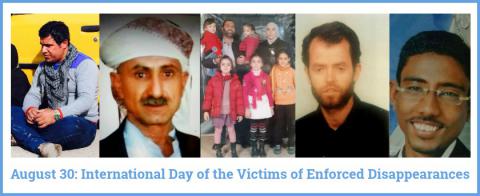
On August 30, Alkarama is observing the International Day of the Victims of Enforced Disappearances by expressing our concern for victims across the Arab World and by encouraging states to respect their international obligations.
Alkarama is deeply concerned by the widespread nature of enforced disappearances across the region, and takes this opportunity to remind all states of their duty to respect “the right to life, liberty and security of person,” as enshrined in the Universal Declaration of Human Rights (UDHR).
Alkarama further urges states to honour the principles outlined in the International Convention for the Protection of All Persons from Enforced Disappearance (ICPPED), a convention which the majority of Arab states are yet to ratify. The convention affirms “the right of any victim to know the truth about the circumstances of an enforced disappearance and the fate of the disappeared person.”
With this in mind, Alkarama considers the following cases to be emblematic of the broad violations of the UDHR and ICPPED across the Arab World:
The Yasin Family: Among the hundreds of cases of enforced disappearances Alkarama has documented since the beginning of the Syrian uprising is the case of the Yasin family. Rania, Abdul Rahman, and their six children - Dima, Entisar, Najah, Alaa, Ahmad and Lian - aged between three and 15-years-old, were arrested on March 9 and 11, 2013 by the Syrian Military Intelligence at their home in Damascus. They have been disappeared ever since.
Mujahed Al Hamdani: Yemeni citizen Mujahed Mohamed Ahmed Al Hamdani disappeared after his arrest by members of the Military Special Security Forces (under control of the Hadi government) on January 1, 2015. He managed to briefly call his family to inform them that he had been abducted, but did not contact them again. His family were unable to file a complaint about his disappearance as the Hadi government lost control of the area, and in the midst of the conflict there were no judicial authorities to turn to.
Lakhdar Bouzenia: A professor of Arabic literature and political figurehead for the Islamic Salvation Front (FIS), Lakhdar Bouzenia was arrested on May 24, 1993 at a police checkpoint in Algeria. He reappeared a month after his arrest when he was finally brought before a judge at Al Milia court, but he was last seen when he was transferred to Constantine prison on October 27, 1993 for his trial. Newspapers on October 31, 1993 published reports that the Algerian security forces had eliminated 11 terrorists, including a person named Lakhdar Bouzenia. His family tried in vain to learn more about his whereabouts but the authorities refused to issue a death certificate or make any official statement about his fate.
Jalal Al Shahmani: On the night of September 22, 2015, Jalal Al Shahmani, a restaurant owner and activist from Baghdad, was arrested by members of a militia group belonging to the Popular Mobilisation Units (PMU) and subsequently disappeared. Al Shahmani had been a well-known organiser of protests against corruption that took place in Baghdad in the summer of 2015, and his relatives believe he was arrested in retaliation for his activism. Al Shahmani’s relatives have been left without any official information about him since the date of his arrest.
Ahmed Gamal Al Din Taher: On September 21, 2016, 34-year-old Ahmed Gamal Al Din Taher was arrested at the Sheikh Zayed checkpoint in 6th of October City in Egypt. On July 12, 2016, Taher was sentenced to 25 years of imprisonment in absentia by the Aswan Military Court, charged with the “bombing of the Kima Police Station.” Following his disappearance his family contacted various authorities, including the General Attorney, the Ministry of Interior, and the National Council for Human Rights, all to no avail. He remains missing for almost a year.
The state authorities responsible for these cases are encouraged to provide information on the victims’ whereabouts or fates, or at the least, to put them under the protection of the law. Alkarama urges states yet to ratify the ICPPED to do so without delay, and to respect the principles outlined therein.
For more information or an interview, please contact media@alkarama.org (Dir: +41 22 734 1008)
